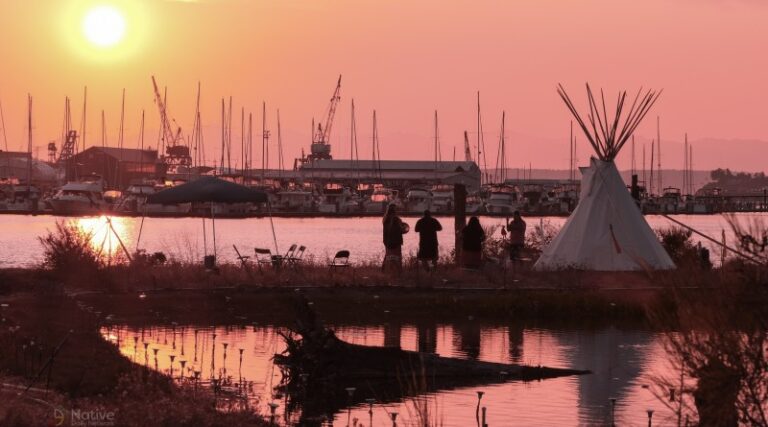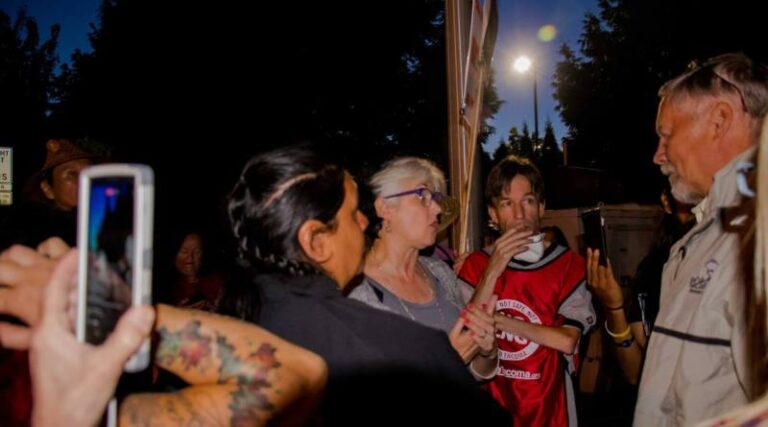by Darren Moore
As dawn broke over the Port of Tacoma, the routine of preparing breakfast and coffee to fuel Native Daily Network for another day was abruptly halted by a text message. Attached was a photo, spectral and haunting—destined to become this article’s cover image. Two kayaks appeared as ethereal forms, cutting through the thick fog of the Hylebos Waterway. The mist clung so densely to the surrounding harbor that visibility was confined to a mere twenty feet. These kayakers, navigating this ghostly landscape, were on a deliberate course toward the construction site of Puget Sound Energy’s Liquefied Natural Gas facility. Though only a 15-minute drive away, the palpable urgency of the unfolding event pierced through the morning’s calm, compelling immediate action and focus.
Committed to delivering an accurate and comprehensive report, we quickly arrived at the Port and initiated a live-stream of the unfolding event. Through immediate on-the-ground reporting, it was soon discovered that two men, Carlo Voli and Steve Way, had locked themselves onto a crane next to the half-finished storage tank.
This is more than a story of resistance—it’s a story of everyday people assuming the mantle of heroism, however heavy it might weigh. Carlo and Steve, perched precariously 50 feet above the ground, were armed with nothing but their courage and a few supplies to last them the day.
As the clock ticked, supporters and activists gathered at the outskirts of the construction zone. People from different walks of life—tribal members, students, and local citizens—all united in purpose. They distributed hot coffee and nourishing breakfast sandwiches to comrades braving the biting cold, and yet the fog concealed Carlo and Steve, like guardian spirits watching from above.
Until this day, the grassroots effort to spotlight the Puyallup Tribe’s fierce opposition to the gas plant had been a tapestry of live streams and social media posts, mostly orchestrated by independent citizen journalists. But today was different. News crews bearing the emblems of Komo, King, and Kiro arrived on the scene, acknowledging a paradigm shift: the struggle for Indigenous sovereignty and environmental justice could no longer be sidelined.
We were fortunate enough to speak with Carlo and Steve by phone. They were resolute and buoyant, vowing to stay put until the end of the workday. For them, the stakes were clear: amplify the voices of the “Super 6”—including activists Marilyn and Cynthia, who were fighting their legal battle in court. The duo’s resolve could be felt through the phone line, a testament to their commitment.
Members of the Puyallup Tribal Council were also present. Tribal elders, spiritual leaders, and Robert Satiacum, a prominent Puyallup tribal activist, formed a prayer circle to bless the direct action. Drums sounded and rattles shook; their vibrations seemed to lift the fog as if commanded by the collective spiritual energy.
With each prayer, the sun grew bolder, as if inspired to break through the morning haze. Finally, at around 3:45 PM, Carlo and Steve voluntarily descended from the crane and were taken into custody without incident.
The day’s events were nothing short of a watershed moment. Despite the arrests, the energy in the air was palpable, as if charged by the synergy of activists, media, and the indomitable Puyallup Tribe. Together, they sent a powerful message that reached beyond the port, beyond the city—echoing into the heart of a world grappling with a climate crisis.
Amid a climate emergency that demands global attention, the Puyallup Tribe’s stand against the Liquefied Natural Gas facility serves as a poignant reminder of how Indigenous lands are disproportionately chosen for ecologically damaging projects. As the facility’s construction moves forward, it continues to encroach upon the Tribe’s treaty rights and challenges their sovereignty, making today’s actions a crucial part of a broader struggle for climate and social justice.
Additional Information: Link to Ancestral Waters Documentary
First appearing on December 11, 2017, this article is part of an ongoing series documenting the Indigenous-led campaign against the Tacoma LNG facility.
The article has since been edited to remove time-sensitive elements, such as calls to action, in order to serve as an historical and educational resource. You can also explore other related articles and resources on the Ancestral Waters page for a more contextual understanding of the issues and events.
While the full “Ancestral Waters” documentary is available for screenings, we invite you to watch the trailer for a glimpse into the comprehensive story of resiliency and activism told in the film.




